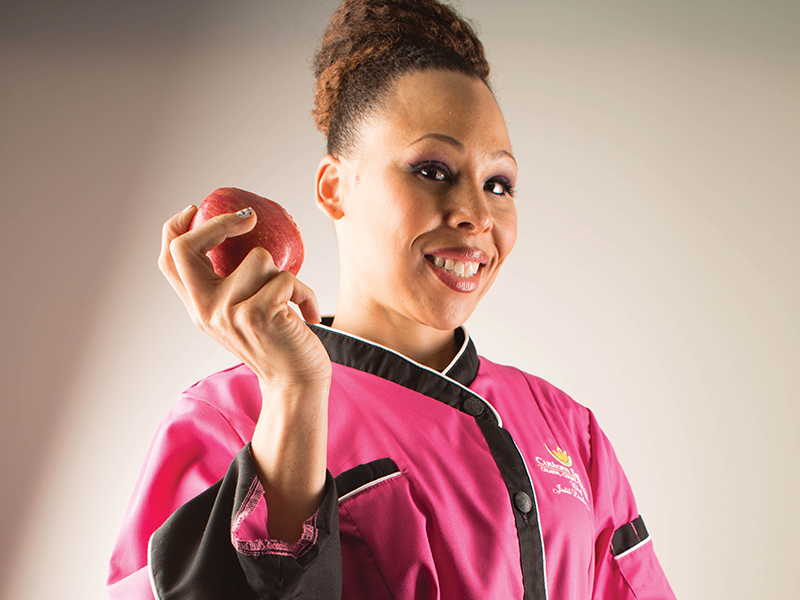Jalil Lindsey-Lowe, Known as The Fit Chef, is a Los Angeles, California, native who has set her roots in Hampton Roads. Lindsey-Lowe preaches a message of complete wellness that starts from the kitchen, flows through the gym and permeates through the rest of each day.
Lindsey-Lowe, a graduate of Johnson and Wales University, is a certified chef and personal trainer who is currently working on her first book, shares her fitness journey and tells why nutrition and fitness can’t be separated.
What’s your story? How did fitness become your lifestyle?
(Laughs) I knew nothing about fitness. I was overweight in high school. So I did research on how to lose weight so that I could join the military. I realized that chips were bad, soda has a lot of sugar, and I’m not going to eat fast food. So I lost weight and got into the military.
When I got out, I let myself go since there was no longer accountability to remain fit. I remember getting my car serviced. I was walking through the shopping center and saw a weight loss clinic. I don’t know what possessed me to go in. They asked me step on the scale. I was shocked that I was at 200 pounds. I said, “Oh, God! I have to do something.” So I signed up. I wanted to lose 30 pounds and I lost 50 pounds. I took the time to learn to eat properly.
It started with weight loss. It wasn’t about exercise at first. I just lost weight. I ate, kept a journal and they counseled me. I started training in the gym, and I did all of the Beachbody programs. Then I decided to enter a fitness competition. It all took off from there.
What led to you becoming a personal trainer?
I became a certified personal trainer because it connected with the nutrition—which I started first [in becoming a chef]. I wanted to design programs. I originally didn’t want to train people, but I realized that I did have a passion to help people get fit.
Why is it important to pair training with nutrition?
Nutrition is the key to getting the results you want. Most people won’t have a problem going to the gym or a group exercise class. That may increase your fitness, energy and focus. But people get discouraged when they don’t see results and they need that to stay motivated. Nutrition helps them to see results in the physical realm. It takes discipline and, depending on what your goal is, you have to maintain your diet.
How true are those Internet memes that say, “You can’t outrun your fork”?
It is true. You can’t out train a bad diet. People can exercise and still gain weight. That is predominantly because they have not changed their diet, they’re consuming too many calories, and they’re getting calories from the wrong place. Twenty-five hundred calories predominately from cookies, snacks and prepackaged foods are not equal in nutrients as the same 2,500 calories coming from whole clean foods. The average person could hardly consume 2,500 calories of whole clean foods in a day, but could exceed that in one fast food value meal. That is because all calories are not created equal. Most of the nutrients that are naturally occurring in whole foods are not present in processed food so they are added back in. In turn, they are not properly absorbed during digestion and this is how someone can easily consume three-times their recommended calories and not be satisfied.
Now that in mind, you also teach people to cook healthy. What does that entail?
I do cooking demonstrations on meal planning and I’ll prepare the meal to show them how. It depends on the request and what people what to learn. I tell them the nutritional benefits of all of the ingredients and I’ll help them with healthier versions of foods they like.
What roles do mindset and moderation play in adopting dietary changes?
It’s perspective. Everyone has a complicated relationship with food. Studies say that changing one thing at a time creates [lasting] change. If you cut soda out, you can lose pounds. Once a week, take a bag lunch. Change to a whole-wheat loaf. Just do little things. If you change everything at one time, you’re going to fail. It’s overwhelming and you haven’t given yourself chance to acclimate.
Gradually grow and then have a support system to hold you accountable. With no accountability, you can go back. It can be a friend, if you can’t afford a coach. It’s about living a healthy life, not torture or feeling deprived.
What’s the rewarding part about helping change lives through nutrition and fitness?
It helps build confidence and self-esteem and that translates into success in other areas.


